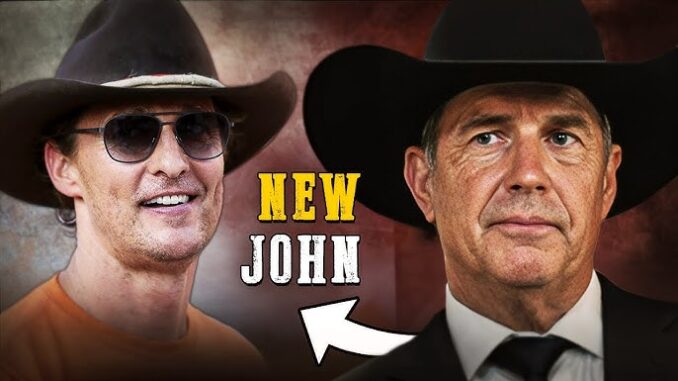
Yellowstone Finale: Who Will Inherit the Dutton Ranch? md07
The wind whips across the vast, unbroken plains of the Yellowstone Dutton Ranch, carrying with it the scent of pine, sage, and the lingering echoes of generations. It’s a land both breathtakingly beautiful and brutally unforgiving, a character in itself, etched onto the very soul of the Dutton family. As Yellowstone hurtles towards its climactic finale, the question isn’t merely who will own the ranch, but who will truly inherit its wild, untamed heart. This isn’t a simple matter of a will and testament; it’s a crucible of blood, sacrifice, loyalty, and the very definition of what it means to protect a legacy. The potential heirs stand as complex, often contradictory figures, each representing a different facet of the ranch’s contested future.
At the epicenter, of course, is John Dutton III, the patriarch, a man carved from the land he defends. His life has been a relentless war against encroaching modernity, against development, against the very forces of time. He carries the weight of his ancestors and the promise to his dying father, a burden that has often manifested as a hardened shell, isolating him from the very family he aims to protect. John’s inheritance is not just land but an ideology: the ranch is the family, and the family is the ranch. But his reign, though fierce, is finite. His greatest challenge has been finding an heir who understands this truth without being consumed by its darkness, a successor capable of wielding both the branding iron and the legal brief.
Kayce Dutton, the prodigal son and John’s most direct male heir by blood, seems the most obvious choice. He possesses the physical prowess, the cowboy’s intuition, and a deep, almost spiritual connection to the land and its creatures. Kayce has tried to escape the ranch’s gravitational pull, seeking peace with his wife, Monica, and son, Tate, on the Broken Rock Reservation, a poignant reminder of contested history. Yet, time and again, he is drawn back, his loyalty to his father and the land proving stronger than his desire for a simpler life. His visions, his encounters with the spiritual world, suggest a profound destiny, a tie to the land that transcends mere ownership. However, Kayce is also burdened by a profound moral compass that often clashes with the ruthless pragmatism required to defend the Yellowstone. His inheritance would likely be one of reluctant guardianship, a constant internal battle between peace and violence, a protector who wishes he didn’t have to fight.
Then there is Beth Dutton, the ruthless corporate shark, John’s most loyal, yet most destructive, child. Beth views the ranch not as a place to ride fences, but as a kingdom to be defended by any means necessary, often through legal warfare and financial manipulation. Her love for her father and the ranch is absolute, a fierce, protective fire forged in the trauma of her childhood. She is the blunt instrument John often needs, willing to cross any line, burn any bridge, to ensure the ranch’s survival. Her inheritance wouldn’t be about working the land, but about owning the battle, about ensuring its continued existence in a world that wants to carve it up. She brings the power of the modern world to bear on an ancient fight, a formidable, terrifying guardian, but one whose methods often leave collateral damage. If Beth inherits, the ranch will survive, but at what cost to the souls of those who live on it?
Jamie Dutton, the adopted son, presents a more complex, and often tragic, claim. A Harvard-educated lawyer, Jamie initially embodied the legal prowess needed to navigate the modern world’s threats. However, his desperate need for his father’s love and approval, coupled with his deep-seated resentment and sense of being an outsider, has driven him down a dark path of betrayal and self-destruction. Jamie believes he can protect the ranch through political power and legal maneuvering, but his motivations are often tainted by a desire to control rather than simply preserve. His intelligence is undeniable, but his capacity for loyalty is suspect, making him a dangerous, unpredictable inheritor. If Jamie were to inherit, it would be a triumph of the mind over the heart, potentially stripping the ranch of its soul in the name of its preservation.
Finally, there’s Rip Wheeler, not a Dutton by blood, but by every other measure, the truest son John ever raised. Rip is the embodiment of the ranch hand, the unwavering loyalty, the silent protector, the man who lives and breathes the Yellowstone way of life. He knows every acre, every animal, every demand the land makes. His marriage to Beth, while a fierce love story, also makes him a de facto part of the Dutton legacy, a bedrock upon which the ranch’s physical operation rests. Rip’s inheritance wouldn’t be about ownership papers, but about the continuation of the ranch’s daily life, its traditions, its hard work. He is the hands and feet, the heart and grit, that keep the ranch functioning. If Rip were to inherit, it would be an inheritance of duty, a silent promise to keep the land alive, not for glory, but for its own sake.
The question of who will inherit the Dutton Ranch isn’t a singular choice, but rather a profound exploration of legacy itself. Will it be the reluctant, spiritual guardian in Kayce? The ruthless, corporate defender in Beth? The calculating, resentful lawyer in Jamie? Or the unwavering, silent protector in Rip? Perhaps the true inheritance will be a blend, a forced coalition, or perhaps, in a tragic twist befitting the Yellowstone universe, the ranch itself will consume its last Dutton, leaving only the wind, the mountains, and the enduring, wild heart of Montana to bear witness. The finale promises not a simple handover, but a reckoning – a final battle for the soul of a kingdom built on blood, loyalty, and the unyielding promise of the land.
